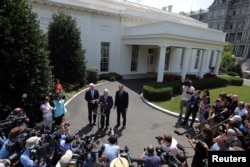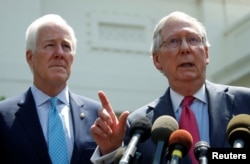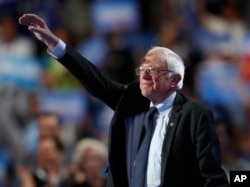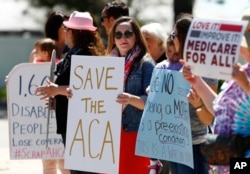Republican lawmakers expressed renewed confidence that they could overhaul America's health care system after meeting Wednesday with President Donald Trump, who told them to cancel their August recess unless former President Barack Obama's health care law, known as Obamacare, was dismantled.
"We should not leave town unless we have a health insurance plan," Trump told Republican senators at a White House luncheon, two days after the caucus' second draft of a health care bill was shelved amid disagreements between fiscal conservatives and more moderate members.
"The differences are narrowing," Senator John Cornyn of Texas said upon returning to the Capitol. "There's more optimism that we could vote on a repeal-and-replace bill, rather than just a repeal bill."
Seven-year promise
Trump emphatically told Republican senators they needed to keep their seven-year promise to voters to repeal and replace Obamacare, formally known as the Affordable Care Act (ACA). Attendees said that message got through.
"There is no question that the president's meeting added a lot of momentum towards getting to a result," said Senator Bob Corker of Tennessee. "He handled it very well."
The health care debate has split Republicans. A handful of conservatives said the party's latest overhaul plan would not pare the federal government's role in health care enough, while moderates said it went too far and would imperil coverage for millions of poorer Americans.
After the White House lunch, Majority Leader Mitch McConnell of Kentucky told reporters the Senate would vote next week on whether to start debate on an outright repeal of the law without a replacement, but also could vote on a repeal-and-replace measure.
McConnell said "no harm would be done" to simply repeal Obamacare, pointing out that a repeal would not take effect for two years and that the bill to scrap Obamacare could be amended at any time.
But the nonpartisan Congressional Budget Office reported later Wednesday that a Senate plan to simply repeal Obamacare without a replacement would cause 32 million Americans to lose their health care by 2026. The CBO estimated the number of uninsured would rise by 17 million in 2018 if the ACA is repealed and no replacement is made available.
Senate Minority Leader Chuck Schumer said the CBO numbers bear out what Democrats have been saying -- a repeal is a "horrible idea" and would "devastate the American health care system."
Prior to the White House meeting, at least three Republican senators said they would vote against starting debate on repeal-only legislation, and four said they would oppose debate on a bill to repeal and replace Obamacare. In both instances, that would be enough to kill the legislation in the 100-member chamber, where the Democratic caucus is united in opposition.
Prior to the White House meeting, at least three Republican senators said they would vote against starting debate on repeal-only legislation, and four said they would oppose debate on a bill to repeal and replace Obamacare. In both instances, that would be enough to bloc the legislation in the 100-member chamber, where the Democratic caucus is united in opposition.
One moderate Republican holdout, Senator Lisa Murkowski, was noncommittal when asked about next week's planned vote.
"There will be a vote on something. That much is certain," the Alaska Republican said.
Democrats still opposed
Whatever changes Republicans may make to the bill to try to unify their caucus, Democrats said they would continue to oppose any effort to scrap Obamacare.
"This is a disastrous proposal, and the American people will not accept it," Senator Bernie Sanders of Vermont, an independent who caucuses with Democrats, told VOA. "Our job is to improve the Affordable Care Act, not destroy it."
About 20 million previously uninsured people have gained coverage because of the law, but insurance premiums have risen under the law and Republicans remain adamantly opposed to its requirement that almost every American must buy insurance or pay a penalty.
Despite Trump's oft-repeated claim that Obamacare is failing, national polls show it gaining in popularity, with significantly higher approval ratings than those for the Republican proposals to replace it.
But some insurers have withdrawn from the market in more rural parts of the country, leaving people there with the potential of not being able to find affordable insurance coverage.
VOA's Ken Bredemeier contributed to this report.








